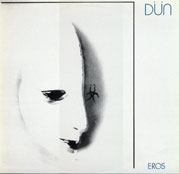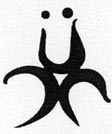![]()
![]()
![]()
![]()
![]()
 |
SOLEIL ATREIDES presents : DÜN "Eros"
|
![]()
![]() HISTORY
HISTORY
1976 saw the birth of the band VEGETALINE
BOUFIOL in Nantes (western France). Around guitar player Fran¨ois
TEILLARD were Laurent BERTAUD on drums,
Jacques BRETONNIERE on piano, Michel
BLANCART on bass and Pascal VANDENBULCKE
on flute who, at the time, was completing his studies at the regional
academy of music.
In 1978 the band changed its name to become KAN-DAAR.
They then set to play covers of the MAHAVISHNU ORCHESTRA
along with the first compositions of the band. KAN-DAAR's
influences were the MAHAVISHNU ORCHESTRA of
course, but also ZAPPA and first and foremost
MAGMA which was like a beacon crystallising
the longings and ravings of the group. Laurent was also a great HENRY
COW fan and soon managed to convey his passion to the rest of
the band.
Philippe PORTEJOIE then joined on sax, along
with Thierry TRANCHANT who took Michel's place
on bass.
The band gave a few concerts around Nantes. Jean
GEERAERTS took over from Fran¨ois on
guitar while Bruno SABATHE replaced Jacques
on piano.
The new band then decided to change its name again to DUNE
which soon would be altered to a definitive DÜN.
At the time Jean and Pascal
were immersed in the world of Frank HERBERT's
novel and from this world also arose such number titles as " ARRAKIS
" and " L'EPICE " , which had been composed
at the time of KAN-DAAR.
The band, now stable, gave around 40 concerts between 1978 and 1981,
all in the Nantes area. Their fame never stretched beyond the limits
of the region and attendance to concerts (generally organised by the
band) was anything from 5 to 300 people.
DÜN opened for MAGMA
in Douarnenez before appearing at the Carquefou festival
in 1979 alongside rock bands such as TELEPHONE
or LITTLE BOB STORY, but also bands closer
to their musical approach such as ART ZOYD
and ETRON FOU LELOUBLAN.
DÜN and ETRON FOU LELOUBLAN
later remained in touch and developped close ties and for a while there
was even talk of DÜN joining ROCK IN OPPOSITION,
the collective launched by HENRY COW. That
never happened, due to neglect and laziness.
In 1980, Philippe (sax) left while Alain TERMOL
joined on percussion. There were more local concerts until 1981 when
it was decided that it was time to record an LP.
DÜN was recommended Etienne
CONOD's SUNRISE recording studio in Kirchberg, Switzerland, by
UNIVERS ZERO who had recorded 2 LPs there
: " HERESIE " in 1979 and " CEUX
DU DEHORS " in 1980.
The recording of the LP was totally financed by the band and so was
the pressing. There was never any time spent looking for a record company.
Recording went on smoothly in excellent conditions and 1,000 copies
of the LP " EROS " were made available around
summer 1981. The band sold the record after gigs without looking for
a national or even regional distribution.
On stage, Pascal played a totally new and
original instrument, the gruyèrophone, also known as swisscheesophone,
which he used to describe to the audience as "a wind instrument belonging
to the hunting horn family, with a tuba mouthpiece and a square-shaped
bell into which small bits of swiss cheese are introduced. The technique
is not unlike that of the bagpipe. When the player is tired of blowing
the instrument, the small holes in the swiss cheese then burst, taking
over from the performer and allowing him to catch his breath".
In 1982, DÜN's line-up changed once more.
Alain TERMOL left and so did Thierry
who was replaced on bass by Christian MEILLER.
Christian DUPONT joined on sax. The musical
colour then changed, moving closer to jazz than the previous band had
and opening a large space for improvisation, contrasting with the very
written approach of former days. This line-up lasted for about a year
and gave a few concerts before the 1983 split.
In 1984, Pascal VANDENBULCKE and Jean
GEERAERTS started NEVROSE SPIRITUALS,
a band playing latin jazz. They gave a few concerts before separating,
Jean having decided to move to the USA in order to perfect his guitar
playing at Boston's Berklee College of Music.
Pascal went on playing jazz through the eighties
and recorded a few albums with Jean-Luc CHEVALIER
(ex-MAGMA), Marc ELLIARD
and Popof CHEVALIER.
Gilles MOINARD, soundman for DÜN,
joined ETRON FOU in 1983 and remained with
them until the last days of the band.
In 1992, a local initiative prompted several Nantes bands to reform
: DÜN, but also rock groups such as TEQUILA
and DANGER.They all performed for one concert
at the Reze MJC in Nantes'suburbs.The band on this occasion was that
of the LP, and this was the last time the name DÜN
was used.
With the CD re-release have been added the first demo versions of "
EROS " and " ARRAKIS
" recorded in 1978 when the band was still known as DUNE
and had Philippe PORTEJOIE on sax, an instrument
which was absent on the Kirchberg record ing sessions.
Also added is a demo of " BITONIO " recorded
in 1979 in Bois Tharon. Those versions are respectively 3 and 2 years
anterior to the LP and are significantly different from those which
would be released later.
At the end of the CD, an unreleased bonus track " ACOUSTIC
FREMEN ". This is a number which used to be played around the
middle of gigs and acted as an acoustic break. The recording is from
1978 and features J. GEERAERTS, P.
VANDENBULCKE and P. PORTEJOIE.
Pascal VANDENBULCKE
- Avec JL et J. CHEVALIER,
M. ELIARD, CRYONIC 3013
( 1985 )
- " " " " " , CRYONIC 3035 ( 1987 )
- Avec le groupe PULSE : Mosa•que
, Auto-production CD ( 1996 )
- " " " : Souffle d'ˇb¸ne, Label
Ouest ND 215 ( 1998 )
Jean GEERAERTS
- Transit zone, RPM 007 ( 1986 )

DÜN logo
![]()
E-mail : soleilzeuhl@soleilzeuhlrecords.com